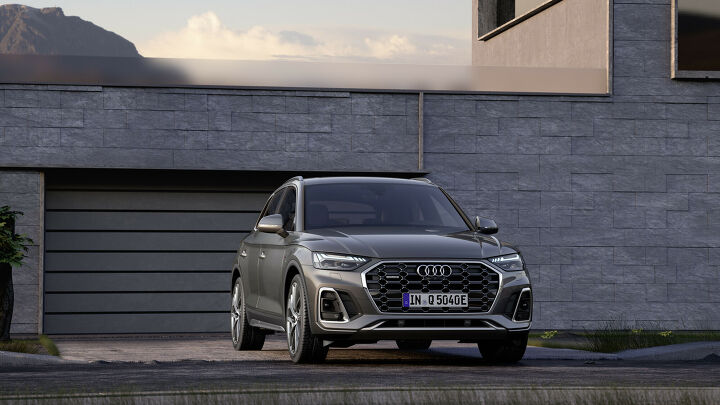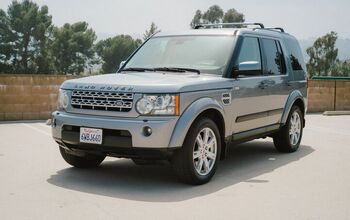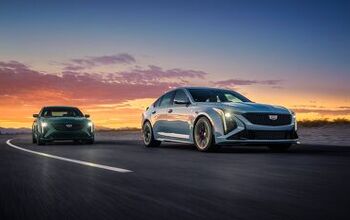Imported Audi, Porsche, and Bentley Models Held Back Over Forced Labor Allegations

Thousands of vehicles manufactured under the umbrella of Volkswagen Group are being held at U.S. ports for allegedly violating the Uyghur Forced Labor Prevention Act (UFLPA). Enacted in 2021, the law is supposed to prohibit the utilization of slave labor in Western China. While the impacted automakers include Porsche, Bentley and Audi, we’ve seen plenty of brands being accused of leveraging forced labor in the Xinjiang region of China, where the country is said to have forcibly concentrated the Uyghur ethnic minority.
The actions the Chinese government has been accused of committing within the region are as horrendous as they are vast. But we’re only interested in the forced labor claims, which date back to roughly 2017 when the first modern reduction and detainment centers were established. Numerous automakers have either been accused of using suppliers that participated in forced labor since then. Concerns have revolved around aluminum, steel, and copper sourcing, tire manufacturing, battery production, and a slew of parts suppliers said to be employing people against their will.
China has defended what’s happening in Xinjiang as an educational program designed to uplift and modernize the Uyghur population in a manner that spurs economic growth. However, numerous human rights organizations and the UN’s top human rights body have suggested the nation may be committing “crimes against humanity.”
Reports have faulted Chinese brands like BYD and Western companies like Audi, Volkswagen, BMW, Mercedes-Benz, Toyota, General Motors, and Ford Motor Co. as having participated (often via Chinese subsidiaries and suppliers) in forced labor practices. Volkswagen Group has often received the most attention, however, likely due to its strong presence in China and an unsavory past where it utilized slave labor during the Second World War.
According to a report from the Financial Times, thousands of Porsche, Bentley and Audi vehicles have been impounded so U.S. authorities could conduct a proper investigation. The big concern of late has been the industrial procurement of aluminum created via forced labor. Before that, VW was being accused of having smaller suppliers manufacturing small electronic components that were similarly believed to be in violation of U.S. custom laws. That item has come up again, resulting in thousands of Audi products, hundreds of Porsches, and some Bentley vehicles all being held back.
From FT:
In a statement, VW said it “takes allegations of infringements of human rights very seriously, both within the company and in the supply chain” including “any allegations of forced labour”.
It added: “As soon as we received information of allegations regarding one of our sub-suppliers, we have been investigating the matter. We will clarify the facts and then take appropriate steps. These may also include the termination of a supplier relationship if our investigations confirm serious violations.”
Questions around forced labour found within its Chinese supply chain are particularly sensitive for VW, which has been facing mounting pressure from human rights groups and investors alike over a facility it jointly owns in Xinjiang’s capital, Urumqi.
The German car company on Wednesday said it would discuss “the future direction of business” in the Xinjiang region with its Chinese joint venture partner SAIC, following the publication of fresh allegations of forced labour in German media.
While your author is often pretty down on China and despises slavery in all formats, it seems plausible that the above is more about discouraging automakers from using Chinese labor than actually trying to solve what’s happening in Xinjiang. The situation certainly looks bad and there are loads of historic examples where the Chinese government has egregiously persecuted dissenting ethnic, religious, and political groups. But it’s hard to gauge how much more U.S. authorities care about that vs tweaking regional trade imbalances.
We’ve also seen more than just Volkswagen Group being accused of having benefited from forced labor over the last few years. But some domestic brands with similarly deep ties to China (e.g. General Motors) don’t seem to fall under the same levels of scrutiny. That said, Ford has fallen under harsh criticism for the alleged Chinese involvement at its new battery plant in Michigan.
Volkswagen has said it plans to contact customers to let them know about the status of the vehicles they ordered in case the investigation causes a delay. It’s assumed that the individual brands will find alternative modules, assuming they’re from facilities utilizing forced labor. But this is likely another black eye for Volkswagen Group and the company will probably need to go out of its way to avoid bad press on the topic moving forward.
[Image: Volkswagen Group]
Become a TTAC insider. Get the latest news, features, TTAC takes, and everything else that gets to the truth about cars first by subscribing to our newsletter.

A staunch consumer advocate tracking industry trends and regulation. Before joining TTAC, Matt spent a decade working for marketing and research firms based in NYC. Clients included several of the world’s largest automakers, global tire brands, and aftermarket part suppliers. Dissatisfied with the corporate world and resentful of having to wear suits everyday, he pivoted to writing about cars. Since then, that man has become an ardent supporter of the right-to-repair movement, been interviewed on the auto industry by national radio broadcasts, driven more rental cars than anyone ever should, participated in amateur rallying events, and received the requisite minimum training as sanctioned by the SCCA. Handy with a wrench, Matt grew up surrounded by Detroit auto workers and managed to get a pizza delivery job before he was legally eligible. He later found himself driving box trucks through Manhattan, guaranteeing future sympathy for actual truckers. He continues to conduct research pertaining to the automotive sector as an independent contractor and has since moved back to his native Michigan, closer to where the cars are born. A contrarian, Matt claims to prefer understeer — stating that front and all-wheel drive vehicles cater best to his driving style.
More by Matt Posky
Latest Car Reviews
Read moreLatest Product Reviews
Read moreRecent Comments
- Tassos Obsolete relic is NOT a used car.It might have attracted some buyers in ITS DAY, 1985, 40 years ago, but NOT today, unless you are a damned fool.
- Stan Reither Jr. Part throttle efficiency was mentioned earlier in a postThis type of reciprocating engine opens the door to achieve(slightly) variable stroke which would provide variable mechanical compression ratio adjustments for high vacuum (light load) or boost(power) conditions IMO
- Joe65688619 Keep in mind some of these suppliers are not just supplying parts, but assembled components (easy example is transmissions). But there are far more, and the more they are electronically connected and integrated with rest of the platform the more complex to design, engineer, and manufacture. Most contract manufacturers don't make a lot of money in the design and engineering space because their customers to that. Commodity components can be sourced anywhere, but there are only a handful of contract manufacturers (usually diversified companies that build all kinds of stuff for other brands) can engineer and build the more complex components, especially with electronics. Every single new car I've purchased in the last few years has had some sort of electronic component issue: Infinti (battery drain caused by software bug and poorly grounded wires), Acura (radio hiss, pops, burps, dash and infotainment screens occasionally throw errors and the ignition must be killed to reboot them, voice nav, whether using the car's system or CarPlay can't seem to make up its mind as to which speakers to use and how loud, even using the same app on the same trip - I almost jumped in my seat once), GMC drivetrain EMF causing a whine in the speakers that even when "off" that phased with engine RPM), Nissan (didn't have issues until 120K miles, but occassionally blew fuses for interior components - likely not a manufacturing defect other than a short developed somewhere, but on a high-mileage car that was mechanically sound was too expensive to fix (a lot of trial and error and tracing connections = labor costs). What I suspect will happen is that only the largest commodity suppliers that can really leverage their supply chain will remain, and for the more complex components (think bumper assemblies or the electronics for them supporting all kinds of sensors) will likley consolidate to a handful of manufacturers who may eventually specialize in what they produce. This is part of the reason why seemingly minor crashes cost so much - an auto brand does nst have the parts on hand to replace an integrated sensor , nor the expertice as they never built them, but bought them). And their suppliers, in attempt to cut costs, build them in way that is cheap to manufacture (not necessarily poorly bulit) but difficult to replace without swapping entire assemblies or units).I've love to see an article on repair costs and how those are impacting insurance rates. You almost need gap insurance now because of how quickly cars depreciate yet remain expensive to fix (orders more to originally build, in some cases). No way I would buy a CyberTruck - don't want one, but if I did, this would stop me. And it's not just EVs.
- Joe65688619 I agree there should be more sedans, but recognize the trend. There's still a market for performance oriented-drivers. IMHO a low budget sedan will always be outsold by a low budget SUV. But a sports sedan, or a well executed mid-level sedan (the Accord and Camry) work. Smaller market for large sedans except I think for an older population. What I'm hoping to see is some consolidation across brands - the TLX for example is not selling well, but if it was offered only in the up-level configurations it would not be competing with it's Honda sibling. I know that makes the market smaller and niche, but that was the original purpose of the "luxury" brands - badge-engineering an existing platform at a relatively lower cost than a different car and sell it with a higher margin for buyers willing and able to pay for them. Also creates some "brand cachet." But smart buyers know that simple badging and slightly better interiors are usually not worth the cost. Put the innovative tech in the higher-end brands first, differentiate they drivetrain so it's "better" (the RDX sells well for Acura, same motor and tranmission, added turbo which makes a notable difference compared to the CRV). The sedan in many Western European countries is the "family car" as opposed to micro and compact crossovers (which still sell big, but can usually seat no more than a compact sedan).
- Jonathan IMO the hatchback sedans like the Audi A5 Sportback, the Kia Stinger, and the already gone Buick Sportback are the answer to SUVs. The A5 and the AWD version of the Stinger being the better overall option IMO. I drive the A5, and love the depth and size of the trunk space as well as the low lift over. I've yet to find anything I need to carry that I can't, although I admit I don't carry things like drywall, building materials, etc. However, add in the fun to drive handling characteristics, there's almost no SUV that compares.


































Comments
Join the conversation
"However, numerous human rights organizations and the UN’s top human rights body have suggested the nation may be committing “crimes against humanity.”
May be committing? that's like saying the Pope may be Catholic. The UN Human rights council is an effing joke. Look at some of their members. Its equivalent to having MS-13, the Bloods, the Crips and the Latin Kings be part of a Police Gang Taskforce. WTF
VW also operates a joint venture plant in the western Xinjiang region with SAIC and is trying to end its association with the JV, because SAIC may have used forced labor to build a test track near the plant.